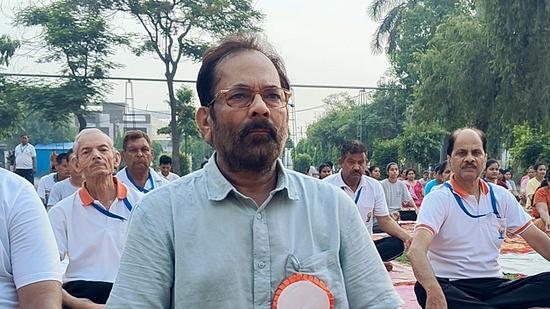
Waqf Act is a Surgical Strike on the Legion of Loot: BJP’s Naqvi
The Waqf Act Amendment, passed recently, has been a hot topic of debate in the country. While many have hailed it as a significant step towards curbing land grabbing and misuse of Waqf properties, others have vociferously opposed it, terming it as an attack on Muslim rights. Amidst this controversy, Union Minister and BJP leader Mukhtar Abbas Naqvi has weighed in, calling the Waqf Act a “surgical strike” on the legion of loot. In this blog post, we will delve into the context of the Waqf Act, the reactions to it, and what Naqvi’s statement means for the future of Waqf properties in India.
The Waqf Act: An Overview
The Waqf Act, also known as the Endowment Act, is a legislation that governs the management and administration of Waqf properties in India. Waqf properties are religious endowments, primarily owned by Muslims, which are meant to be used for the benefit of the community. The Act was first introduced in 1954 and has undergone several amendments since then. The latest amendment, passed in 2020, aims to bring transparency and accountability in the management of Waqf properties.
The Controversy Surrounding the Waqf Act Amendment
The Waqf Act Amendment has been criticized by several opposition parties, who claim that it is an attempt to undermine the rights of Muslims and to hand over Waqf properties to the government. They argue that the amendment allows the government to take control of Waqf properties without the consent of the Waqf boards, which are responsible for managing these properties. The opposition has also raised concerns that the amendment could lead to the misuse of Waqf properties by the government.
Naqvi’s Statement: A Surgical Strike on Land Grabbing
In response to the criticism, Union Minister Mukhtar Abbas Naqvi has called the Waqf Act Amendment a “surgical strike” on land grabbing. He has accused those opposing the amendment of lacking logic and having a “famine of facts” during the discussion on the amendment in Parliament. Naqvi has also accused them of launching a communal attack on the Constitutional reform.
Naqvi’s statement is significant, as it reflects the BJP’s stance on the Waqf Act Amendment. The BJP has long been critical of the misuse of Waqf properties and has accused previous governments of turning a blind eye to the issue. The party has also been vocal about the need for transparency and accountability in the management of Waqf properties.
What Does Naqvi’s Statement Mean for the Future of Waqf Properties?
Naqvi’s statement is a clear indication of the BJP’s commitment to tackling the issue of land grabbing and misuse of Waqf properties. The party has long been critical of the lack of transparency and accountability in the management of Waqf properties, and the Waqf Act Amendment is seen as a step towards curbing this practice.
The statement also reflects the party’s willingness to take bold steps to reform the system. Naqvi’s use of the phrase “surgical strike” is significant, as it suggests that the government is willing to take decisive action to tackle the issue of land grabbing.
However, the opposition’s criticism of the amendment is also significant, as it highlights the need for greater transparency and accountability in the management of Waqf properties. The opposition has raised legitimate concerns about the amendment, and it is essential that the government addresses these concerns to ensure that the amendment is implemented in a manner that is fair and transparent.
Conclusion
The Waqf Act Amendment is a significant step towards curbing land grabbing and misuse of Waqf properties in India. While the opposition has criticized the amendment, it is essential to acknowledge that the government has taken a bold step towards reforming the system. Naqvi’s statement reflects the party’s commitment to tackling the issue of land grabbing and its willingness to take decisive action to reform the system.
As the government implements the Waqf Act Amendment, it is essential that it addresses the concerns of the opposition and ensures that the amendment is implemented in a manner that is fair and transparent. The amendment has the potential to bring about significant changes in the management of Waqf properties, and it is essential that it is implemented in a way that benefits all stakeholders.
Source:





